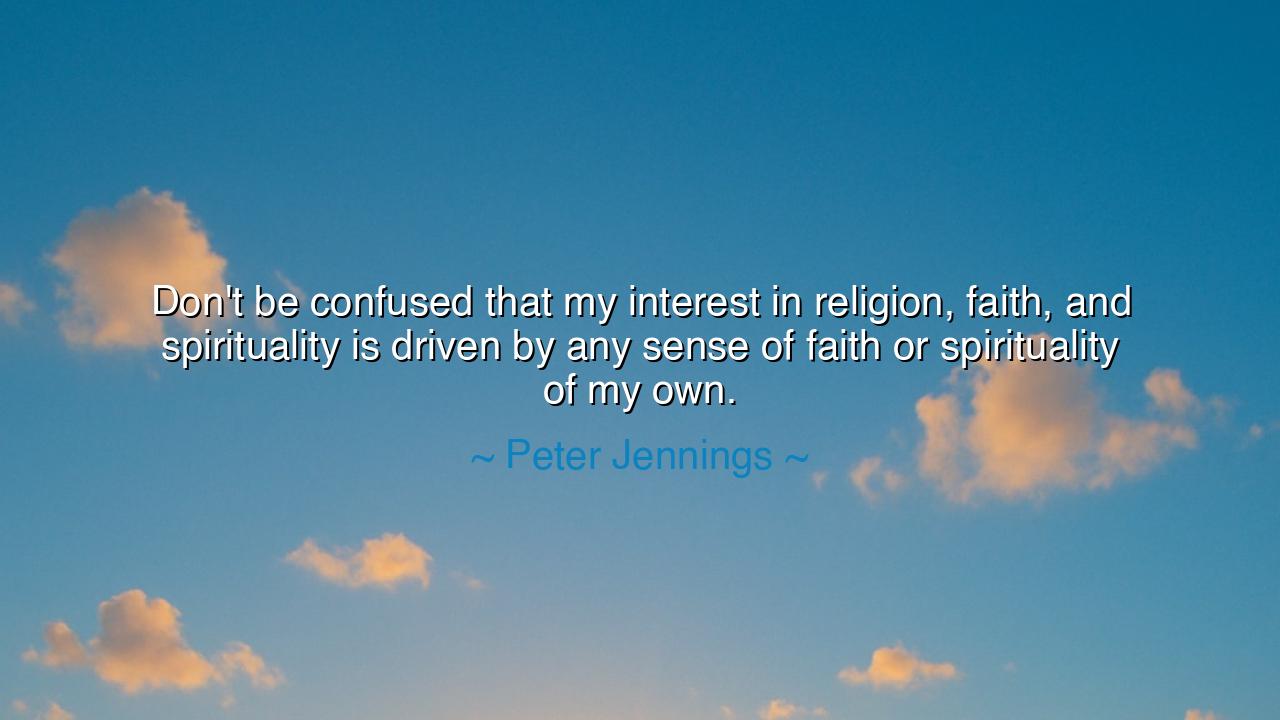
Don't be confused that my interest in religion, faith, and
Don't be confused that my interest in religion, faith, and spirituality is driven by any sense of faith or spirituality of my own.






"Don't be confused that my interest in religion, faith, and spirituality is driven by any sense of faith or spirituality of my own." – Peter Jennings. These words, spoken by the celebrated journalist, reveal a deeper reflection on the nature of human inquiry, and how we, as individuals, often find ourselves drawn to profound subjects not out of personal belief, but out of the desire to understand. Jennings’ words speak to the essence of impartial inquiry, the kind of quest for truth that transcends personal bias or subjective involvement. His statement implies that it is not necessary to believe in something to seek to understand it, and that objectivity and curiosity should guide our exploration of the mysteries of the world.
In the ancient world, the great philosophers and seekers of wisdom were often not men of strong religious or spiritual conviction, but rather men of deep inquiry. Socrates, for instance, was not a priest or a prophet, yet he spent his life exploring the very nature of virtue, the divine, and the soul. His commitment was to philosophical truth, not to a particular faith. He questioned and challenged the spiritual beliefs of his time, not out of opposition to them, but to understand the very foundation of morality and existence. The true seeker of wisdom does not need to adhere to a belief system to engage with its concepts; instead, they seek understanding through intellectual and spiritual curiosity.
Similarly, Confucius, the wise sage of ancient China, was not a religious prophet, but his teachings centered around the importance of ritual, respect, and the spiritual connection to society and the cosmos. Though his teachings touched on spirituality, they were grounded in practical wisdom and human relationships rather than divine mandates. His path was not that of a believer but that of an explorer of humanity’s moral and ethical depths. Just as Jennings was intrigued by spirituality without needing to be personally invested in it, Confucius understood that the study of religion and philosophy could be approached from a place of intellectual engagement rather than blind faith.
Consider the example of Thomas Paine, the Enlightenment thinker and author of The Age of Reason. Paine is known for his critique of organized religion, yet his interest in religious philosophy was profound. He approached religious texts not with the eyes of a devout believer, but with the curiosity of a critical thinker, seeking to understand the origins and implications of religious ideas. Paine's exploration of faith was born out of intellectual rigor, not out of any personal devotion to the doctrines he studied. He, like Jennings, approached religion with a sense of impartial inquiry, seeking truth in a way that was free from personal bias or doctrinal attachment.
Jennings' statement also invites us to reflect on the difference between belief and inquiry. Faith and spirituality, as he implies, are often deeply personal, but the study of these concepts need not be confined to the realm of personal belief. The great minds of history—whether scientists, philosophers, or writers—have long demonstrated that it is possible to engage with religion and spirituality from a place of curiosity, without necessarily adopting the beliefs themselves. Their role, like that of a scholar, is to investigate, question, and understand, not to necessarily subscribe to what they study.
In our own lives, let us take Jennings’ message to heart. We do not need to adopt beliefs to explore them; it is the human condition to seek understanding, and it is through this pursuit of knowledge that we grow. Whether it is religion, philosophy, or any other complex subject, we are encouraged not to act from a place of faith, but from one of inquiry, curiosity, and open-minded exploration. By approaching the mysteries of life from a place of intellectual honesty, we are better able to understand the world around us without the interference of personal bias or unexamined assumptions.
So, let us remain humble in our pursuit of wisdom, recognizing that our personal beliefs are not the end of our understanding, but rather a stepping stone toward deeper insight. We must not shy away from studying subjects that do not align with our personal convictions, for in doing so, we not only expand our own minds but contribute to a greater understanding of humanity’s spiritual journey. To question, to inquire, to seek knowledge—this is the true path of the seeker, and it is through this pursuit that we connect with the very essence of wisdom.






AAdministratorAdministrator
Welcome, honored guests. Please leave a comment, we will respond soon